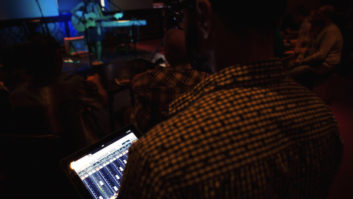A promising oboist 20 years ago, Elaine Martone never thought or aspired to be a record producer or, for that matter, a label executive. Nonetheless, today she works closely with the top names in jazz, blues and classical music in both capacities. Her job, VP of production and A&R at Telarc Records, requires Martone to delicately balance the often-conflicting worlds of creativity and management. Fortunately, she has a knack for it and juggles the two areas quite well.
The producer/executive grew gradually into her current, enviable position. She came up through the ranks, flourishing in each position assigned, although they all differed greatly from her previous background. While growing up in Long Island, N.Y., she was cultivated in classical music mainly through her father; she discovered jazz at age 14 when she first heard her high school’s big band. Both genres made strong imprints on Martone as she furthered her musical education with a B.A. from Ithaca College in upstate New York. From there, she went to Cleveland to study with the city orchestra’s oboe players and had high hopes of getting into its prestigious Institute of Music (CIM).
Alas, she wasn’t accepted at CIM, but around that time, she got a tip about job openings at Telarc Records. That was in 1980, and the pioneering audiophile company consisted of seven employees when she started in quality control evaluating test pressings. Most would have viewed the entry-level gig as sheer monotony. Not her. She applied her organizational abilities and whipped its master room of mountains of misplaced and unlabeled masters into shape. Additionally, she developed a system to objectively evaluate test pressings. All the while, Martone played with the Canton (Ohio) Symphony and continued auditioning.
Martone thought the QC job would run its course in about two years and she would be in a master’s program or with a larger symphony. But a funny thing happened as Martone started to learn about the record-manufacturing operations at Telarc. “I got so involved in the musical things that we were doing here,” she explains, “and because the company was so small, I really got an opportunity to contribute in a way I never could have at a major label in New York, L.A. or Nashville.” Before long, she advanced into digital editing (then in its infancy as a science/art) and was eventually brought into discussions concerning artists and marketing. She was seemingly doing it all.
When a producing opportunity arose at the label, Martone was thoroughly prepared. She was a musician, understood technical and quality criteria and had developed a heightened sense of timing for recordings through editing. In 1988, she began producing classical recordings and, in 1989, co-produced Telarc’s landmark initial jazz recording, After Hours, featuring André Previn with Ray Brown and Joe Pass. Its success paved the way for jazz on the label, and later blues, with many recordings produced by the company veteran. Three years later, Martone established two of her most significant relationships: one with Brown — together, they created 17 stellar recordings — and the other was with Telarc president Robert Woods, who became her husband. It could be said that the record company became her family when she married him, but the company and business were in her blood long before that.
How would you classify yourself as a producer?
I’m not sitting in the studio with the musicians. I know there are some producers that sit in the studio with headphones and I call them really hands-on. That’s not me. I’d say I’m a musically involved, technically aloof record producer. The most I get involved creatively is to change the arrangements a little bit: the form if too many songs are laid out the same way, or to change tempo and maybe the feel. But I’m not a composer. My thrust is musicians, but I like working with vocalists, too. I feel for them. You kind of have to “up” your game and really be very vigilant about making sure that they’re communicating the song, along with the musical elements.
Do you have a special approach to working with artists?
My overall philosophy when I work with musicians is that I am there to serve the music and their vision of the music — whatever it takes to make them the most comfortable and get the highest-quality performance from them. As a musician, I also wanted to be treated with respect. I feel that Telarc treats these people — many among them being legends — that way. Another thing I think is important as a producer is to get out of the way. It’s not about me.
Does being an executive and a producer ever pose problems for you?
The musicians with whom I deal with and produce know I’m a vice president here and I’m married to the president. So if they have something to complain about, I can actually do something about it. I think it’s one of the benefits for artists working with a small company to have access to all of the people involved.
There’s really not a lot of bullshit. We’re really efficient in our work habits, and the artist knows that the material really does need to be rehearsed, prepared and ready to go when we go into the studio. Not that it always is, and sometimes we’re working on a tune and it’s just not happening. So we move on and go to the next one. Sometimes, we have to add more hours, but I’ve never needed another day or more.
What recording media are you using?
We do all of our recordings on Direct-Stream Digital (DSD), and we use the SADiE and Sonic systems along with DSD editors. We don’t use Pro Tools. In the early Soundstream days, we would go to Salt Lake City or L.A. to edit where there was a roomful of hard drives. Now, we have three or four different digital-editing systems in-house, and I don’t deal with any of those. What I end up doing is going in and listening at different stages of production and saying “yea” or “nay.”
Do you have any equipment preferences?
No, I leave that to my engineers. I work mostly with Michael Bishop and with Jack Renner. I tell them what the musical needs of the session are, the instrumentation, the concept and what we’re going for. Then we talk about how and where. The engineers set up the mics and the equipment, and I listen. Then I comment, and they translate my musician-ese into engineer-ese.
Do you ever work in overdubbing/multitracking situations?
Not really. The most overdubbing I do is for vocals. I rarely work with lots of layering and multitracking. Michael Bishop is our expert whenever we need anything like that.
If we’re recording a trio, I like for them to all be in the main room. That way, you get the best musical interaction. When you have a singer and need to do overdubs, you have to have isolation. We tend to record the trio as a unit live to 2-track. With the singer, we have the ability to do overdubs or a live take. I always prefer a live take because you get the magic. But with an overdub, you go for perfection, though you might lose the passion.
What are your biggest challenges as a producer?
Always getting the music to really communicate so that I’m actually moved. Because I know if I’m moved, then you, as a listener, will also be moved by what’s going on. I always try to remember that music and any other art is about some kind of communication between people. In the sterile atmosphere of a studio, it’s really easy to be preoccupied with getting everything right, as opposed to getting people to hear what a musician has to say in a way that hasn’t been heard before. That’s always a big challenge.
What are some career milestones?
Working with Ray Brown has to be right up there, and hearing his stories about being on the road in the ’50s, living in New York in the ’60s and moving to L.A. Also, being a part of his family and knowing his wife — that’s really been a privilege for me. Meeting and getting experience with Mel Tormé. Really pursuing Benny Green: I heard him play with Ray, and I think he was already signed with Blue Note. I told him how much I loved his music and that Telarc could really serve him. Meeting and working with Oscar Peterson and getting a sense of history when he and Ray would share stories. Additionally, meeting people like Freddy Cole, Monty Alexander, Joe Williams and also working with André Previn. My very first great experience in jazz was when we got to produce André Previn, Ray Brown and Joe Pass for the first jazz recording we did in ’89. I brought My Fair Lady and asked André to sign it. He said, “Thanks for asking me to sign it 30 years later.”
Ray Brown’s death must have had a big impact on you. What was he like in the studio?
When I started working with Ray, there was no messing around. We would do two takes, and if it wasn’t swinging in two takes, it would be time to move on. When he came into the studio, you were on his time. That was a great education for me, because some younger musicians like to do numerous takes. Ray taught me that when you’re in a studio, it should all be worked out. Number two with him, and I absolutely love this: I remember calling him up and saying, “Ray, we’re thinking of calling this album Don’t Get Sassy.” And he said, “Elaine, I play the bass; you make the record. You don’t tell me how to play the bass; I don’t tell you how to make the record.” Most artists want as much control as possible, but Ray wasn’t like that.
I loved working with him. One of the other great things about him was that he was always mentoring young jazz musicians. He was very generous with his time. Ray was always looking for what was the “next thing.” He was always composing, thinking about concepts, and when he came off of the road from touring, he’d call me up ready to record something. It was remarkable working with him.
Who are some of the other special artists you’ve worked with?
I’ve only made three records with McCoy Tyner, and he was one of my idols in college. I remember when I found out I was going to be producing his project — it was him and a Latin big band, so there were nine guys altogether. I’m 5-foot-1 and pretty little, and I was thinking, “How am I going to do this?” and I was really scared. I’d heard that McCoy wasn’t that nice of a guy. Well, that was so far from the truth! He’s the most gentle, kind man and absolutely brilliant, and he’s very quiet and kind of shy. Working with him was like being in the presence of absolute greatness, and I had to pinch myself because I was working with a man of that caliber.
I’ve produced one of Dave Brubeck’s records, but for the most part, he has his own producer. He’s also a very kind and gentle soul, and at 83 years old, he’s still very creative and on top of his game.
Do you think you could be an independent producer or work for another label?
It’s hard to tell, but my gut says no. Way before I married Bob 10 years ago, my creative input counted for something. The way we run things here isn’t bureaucratic, and I can’t imagine that my opinions would count at another label at this stage of the game. I’ve had a lot of input into the creative development of the label, and specifically the production department. Also, here I can set the tone for things, and that’s very gratifying. Being an independent producer seems like an interesting balancing act between artist and record company. Although, sometimes I’m in that position with my own artists — when I have to push for something that the company isn’t in favor of. I’m glad I have a home [record company].
Are there problems being a woman and working mostly with men?
It was more of an issue when I started, and I think it actually wasn’t as much of an issue to them as it was to me. I have been concerned about it at different points of my life, and it’s currently not a problem. I’m happy to be a woman, and I’m happy to bring what I do to the table.
Is it difficult to switch between producing jazz, blues and classical?
It’s not. I switch many times during a day. For classical, the planning phase is a lot longer because you’re dealing with orchestra schedules that are planned two to three years in advance. I know I’m going to be recording Mahler #3 in London at the end of January. But between now and January, there could be six new jazz projects that we plan and execute. That’s a big difference, and when we got into jazz, the lead times became a lot shorter. So the looser the musical structure, the shorter the lead time. With an opera, there might a 120-page booklet you have to put together besides the three-CD opera set. In jazz, you might call up and say, “I’ve got this great band playing at the Blue Note. Do you want to come record it?” That’s pretty much how it went down for the first Oscar Peterson record in 1990. That happened in a week. You’d really have to move heaven and Earth to do that for classical music.
Who influenced you as a producer?
I think Tommy LiPuma is outstanding, and I would love to watch him work. If I could be anybody, I’d like to re-create myself as George Martin, because he was the creative producer at its finest. From my point of the view, The Beatles would have been a completely different entity without him. People call him the fifth Beatle, and what he contributed as a record producer completely changed the face of music. That’s really inspiring.
What is the most difficult aspect of producing and working in management?
Watching the industry go through all of the changes in the past few years. Seeing really talented artists lose their contracts and what we now have to do to just stay alive. It has really been stressful, and last year was hard in terms of the world and 9/11. In the ’80s, we felt like we were on top of the world, and it seemed like we could do anything we wanted to do. Then, when the ’90s came in, a lot of that eroded. Now, in 2002, I’m yearning for the time when money was free flowing and if you wanted a piece of equipment, you just got it. And if you wanted to do a project, great, let’s go do it! We didn’t have to worry like we do now and keep all of the budgets really tight and find the least-expensive way to do the highest quality.
What are some of your goals?
I have to have a Grammy. I’ve been nominated before and would like to win one before I’m 50. I would like to see Tierney Sutton [a Telarc vocalist] really make her mark and become a household name. I’d like to expand with some younger artists and keep jazz alive and thriving. We’ve done a little of that with Benny Green and Russell Malone. It’s a mission for us, and that goes for classical music, too.
Chris Walker is a contributing writer to Mix.







